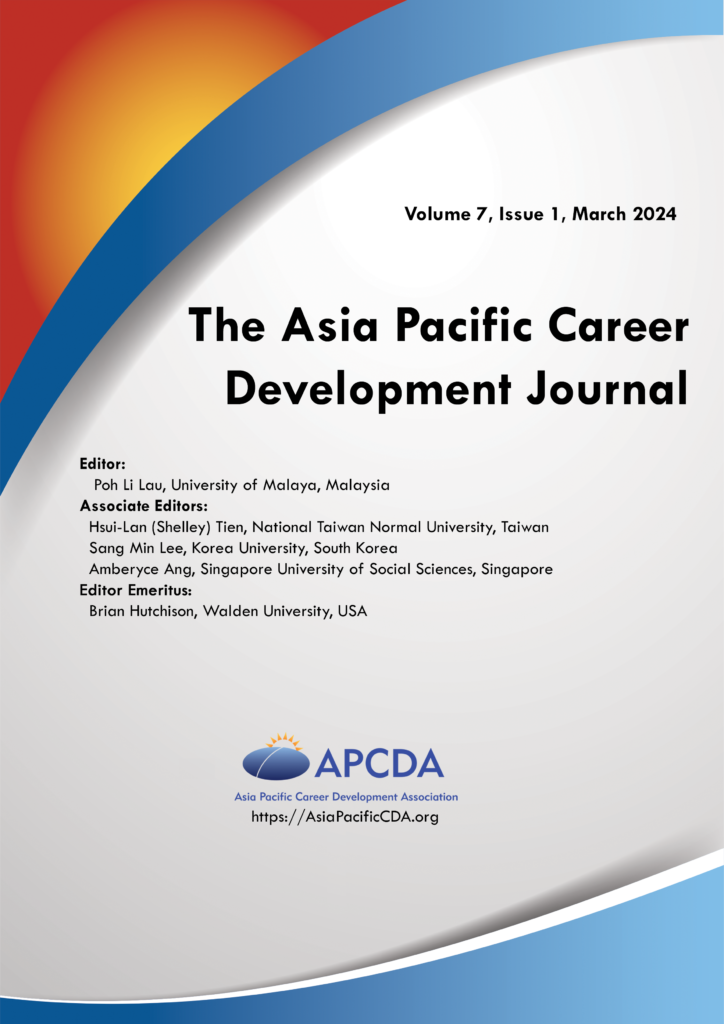The Asia Pacific Career Development Journal, Vol 7, No 1
Vol 7 No 1 (2024): March 2024 Issue
Published: 2024-03-23

Dr. Poh Li Lau welcomes you to the March 2024 edition of the APCD Journal.
Lead Article
Xinling Liu and Patrick Rottinghaus
Abstract: With the Asian hate outbreak during the COVID-19 pandemic, East-Asian international students in the United States experienced more overt racial discrimination and attacks while seeking education far from home. This study used the well-being model of the social cognitive career theory to examine the factors contributing to academic satisfaction considering 325 East-Asian international students as the study subjects (Mage = 22.30, SDage = 4.82; nmale = 162, nfemale = 155). Perceived discrimination was used as an environmental barrier in the model. Multigroup measurement invariance and multigroup structural equation modeling were employed to examine the gender differences in measurement constructs and predicted pathways. The results revealed that the two gender groups were equivalent at the scalar level, and the proposed model presented a good fit with the data across both sample groups. Perceived discrimination contributed to academic satisfaction through academic self-efficacy and goal progress. In addition to the above findings, this paper discusses the study’s implications, limitations, and future research directions.
Empirical Article 1
Shannon Lin and Zeng Lin
Abstract: This study explores various factors influencing the career performance of university professors in China and the United States, utilizing rank, income, and the number of published journal articles as performance measures. Despite the widely acknowledged role of family background in an individual’s educational and professional pursuits, our findings reveal that it fails to statistically predict the career performance of university professors. In certain instances, it even negatively affects faculty career performance. This pattern is evident in both China and the United States. Thus, despite the social, economic, political, and ideological disparities between the two nations, their remarkable similarity in the absence of a correlation between family background and career performance among academics is noteworthy.
Empirical Article 2
Chin Chi Wu and Hui Fang Chen
Abstract: Employing the framework of the social cognitive career theory, this study investigated the relationship between internship satisfaction and career optimism, as well as the mediating impact of career decision self-efficacy, considering two covariates: support from the workplace and university. Using data collected from a sample of engineering undergraduates at a university in Hong Kong (N = 140), the following two hypotheses were tested: 1) Internship satisfaction positively correlates with career optimism (H1), and 2) career decision self-efficacy mediates the positive relationship between internship satisfaction and career optimism (H2). The results revealed that career decision self-efficacy completely mediated the association between internship satisfaction and career optimism, with internship satisfaction alone significantly predicting career optimism. However, the covariates exerted only minimal impacts on career optimism. These results are important as they can provide human-resource and educational professionals, as well as other relevant stakeholders, with valuable insights into the relationship between internship satisfaction and its reported determinants.
The Asia Pacific Career Development Journal (APCDJ) is an international biannual publication dedicated to all career development and intervention related topics. It is the official journal of the Asia Pacific Career Development Association (APCDA; https://AsiaPacificCDA.orgThe journal welcomes submissions focused on, but not limited to, the following topics: career counseling, individual and organizational career development, work and leisure, career education, career coaching, and career management.
